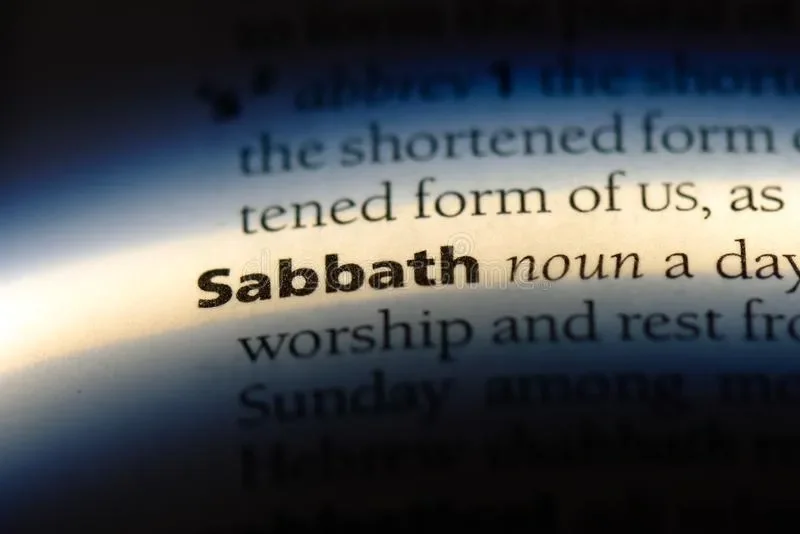Lord of the Sabbath

For the Son of man is Lord even of the sabbath day. Mt. 12:8
Many of us at one time or another have struggled with how to apply the Fourth Commandment to our lives: “Remember the Sabbath Day, to keep it holy.” There are a number of problems. One problem is that, strictly speaking, the Sabbath Day is the seventh day of the week, not the first. So there is the question of whether or not Christians should keep Sabbath on Saturday or Sunday. There are many Christians, even to this day, who are emphatic that you are violating the Sabbath if you do not rest from all work on Saturday. Others uphold what they call the Christian Sabbath and argue that Christians should observe the Sabbath Day on the first day of the week, since that is the day on which Jesus was raised, and it is pretty clear that it was on that day that the early church regularly got together to worship (cf. Acts 20:7; 1 Cor. 16:2).
Then there is the question of how to observe the Sabbath Day. Are Christians supposed to rest entirely from all work on that day? Some say that the Sabbath Day has been fulfilled in Christ and that we are no longer under the obligation to literal, physical rest one day a week. They would claim that the Sabbath regulations hold the same sway over Christians as do the ceremonial regulations of the law. In fact, many would put them in the same category.
Of course, the whole problem boils down to the fact that the Fourth Commandment is, well, the Fourth Commandment. Since it is pretty clear that all the other nine commandments are still in force, why would the Fourth Commandment be any exception? The argument is that though the ceremonial law is no longer in force, the moral law is. And the moral law is summarized in the Ten Commandments. Just as the prohibition to commit murder transcends covenantal discontinuities, so also does the prohibition to violate the Sabbath Day. Or does it?
Looking at passages such as the one before us is incredibly helpful in getting a proper perspective on the Sabbath Day. Remember that the context is the increasing opposition to Jesus, his disciples, and their ministry. Here, the Pharisees accuse Jesus’ disciples of breaking the Sabbath (ver. 2). Our Lord’s response is instructive to the current debate, because he answers on two levels. On one level, he argues convincingly from the Law that his disciples had in fact not violated the Sabbath. So the accusation was false for that reason alone. But Jesus makes another argument, one which I think sheds much light on the issue of Sabbath observance. He argues that he is the Lord of the Sabbath. I think it is important for us to understand exactly what he means by that in order to really come to grips with our place in Sabbath observance. In effect, he is arguing that he is the fulfillment of the Sabbath, as he is of the whole Law. The Law is to be interpreted in reference to Christ, to whom the Law points.
I don’t think it is coincidental that this passage comes on the heels of Matthew 11:28-30, where Jesus invites the weary to find rest in him. Essentially, in that passage our Lord is telling people that he is the one in which the Sabbath finds its ultimate fulfillment. The Sabbath pointed through physical rest to the rest that we find in God. We see the same thing going on in Hebrews. When the author of Hebrews exhorts his readers to enter into rest, he is obviously referring to finding rest in Christ (Heb. 4:1). But then he goes on to interpret this rest in terms of the Sabbath, of entering into God’s rest (Heb. 4:4). After explaining that this rest should not be interpreted in terms of the inheritance of the land of Canaan (Heb. 4:5-8), he concludes that “there remaineth therefore a rest for the people of God. For he that is entered into his rest, he also hath ceased from his own works, as God did from his. Let us labor therefore to enter into that rest, lest any man fall after the same example of unbelief” (Heb. 4:9-11). To fail to believe is to copy the example of the unbelieving Israelites who did not enter into the land of Canaan (Heb. 3:19). But in this context, it is not a failure to believe the promises to enter into the land of Canaan, but a failure to “hold fast the confidence and rejoicing of the hope firm unto the end” (Heb. 3:6), a hope that is centered in Christ as the Apostle and High Priest of our profession (Heb. 3:1, cf. 3:14). To keep the Sabbath, according to the author of Hebrews, is to firmly trust in Jesus as Lord and Savior, to find one’s rest in him. And in him alone we find the true and eternal and satisfying rest. Thank God that Jesus is Lord of the Sabbath!